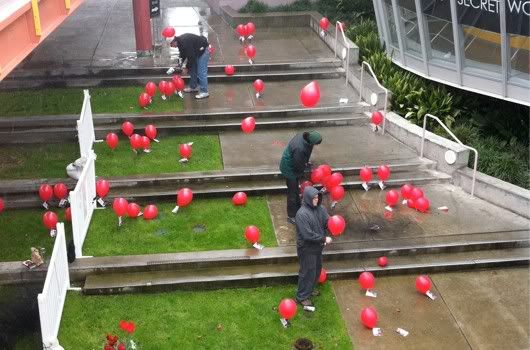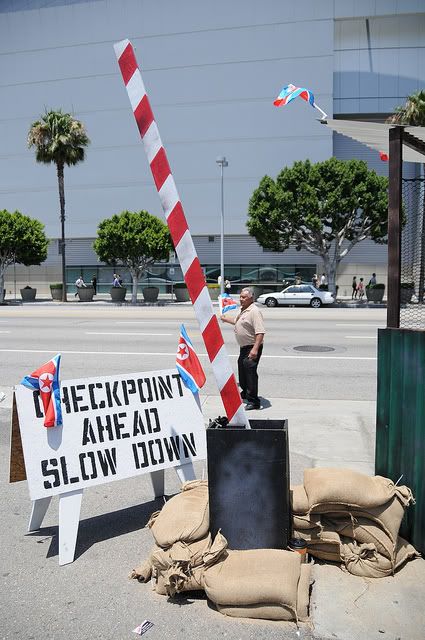This post has not been edited by the GamesBeat staff. Opinions by GamesBeat community writers do not necessarily reflect those of the staff.

In 2010, THQ gave the gaming world one of the largest marketing campaigns it has ever seen. The effort focused on the first-person shooter, Homefront. THQ knew that it needed to make a big splash with this game, and if it succeeded, it would have its very own Call of Duty-style franchise. The publisher's attack plan was simple. You have to spend money to make money.
And THQ spent a lot of money on the marketing.
Look no further than the picture above. The marketing firm in charge of promoting Homefront thought it would be a great idea to launch 10,000 red balloons in the San Francisco area to gain attention for the title. Sure, this stunt made headlines, but it also led to a $7,000 fine.
THQ also cranked the marketing notch to 11 at that year's Electronic Entertainment Expo. It rented out the entire parking lot across from the Los Angeles Convention Center, giving free parking on behalf of the “North Korean Federation.”
At some point, these types of stunts can't be considered marketing but more of a colossal waste of money.
The strategy generated buzz for THQ, but did it pay off? Well, Homefront sold quite well out of the gates. After a while, those high sales wore off. Marketing can only do so much once a game goes public. Ultimately, the quality of the title does the selling. And in Homefront's case, it didn't sell that well in the long run. I highly doubt that the massive marketing campaign for the shooter was worth the investment, also considering that its developer, Kaos Studios, ceased operations shortly after.
 Desperation can be a turn off in these cases. Seeing THQ throw out all it had to promote Homefront gave the game a tainted image even before it was released. The publisher looked like it was admitting that the game wasn't high quality — that the title needed a lot of marketing in order to actually sell.
Desperation can be a turn off in these cases. Seeing THQ throw out all it had to promote Homefront gave the game a tainted image even before it was released. The publisher looked like it was admitting that the game wasn't high quality — that the title needed a lot of marketing in order to actually sell.
The Call of Duty franchise is also known for excessive marketing. Activision, however, also knows how to generate amazing appeal for its games. Sometimes it is more prudent to have well-placed ads instead of throwing the product in consumers' faces.
Take Call of Duty: Modern Warfare 2 for example, it was the first game in the franchise to have the reveal trailer on national TV during an NBA playoff game. That trailer alone generated a lot of excitement for a game that would not be coming out for five months. Something as subtle as a strategically positioned trailer can make all the difference.
This was back when the Call of Duty onslaught had yet to be seen. Activision knew it had a great franchise, and it used its marketing to spearhead the biggest entrainment launch of all time. I fell prey to the advertising. I was in line at midnight to pick up my copy of MW2.
Activision can also be excessive at times. Just look at its Call of Duty XP event, which featured paintball matches, multiplayer tournaments, and live performances from popular artists.
In the end, advertising can get copies of your game sold, but publishers need to see that marketing can be potentially wasted on certain titles that won't sell well in the long run. THQ fumbled its plan with Homefront. Activision perfected it with Call of Duty.
